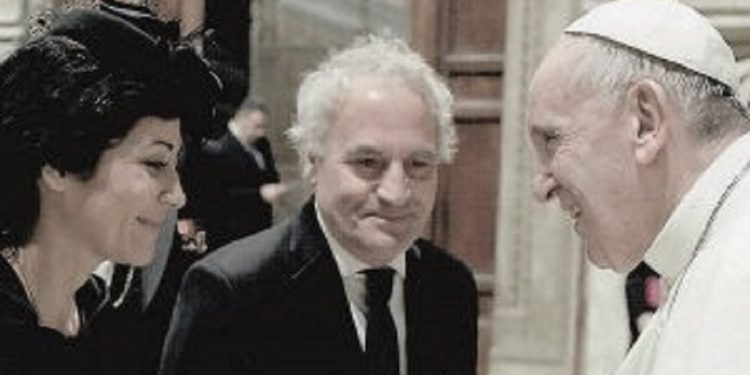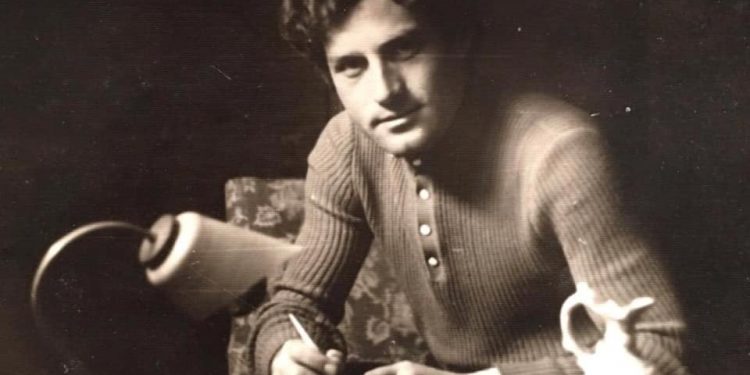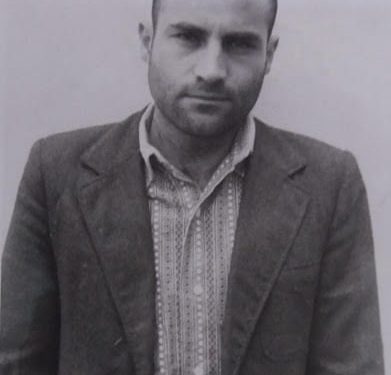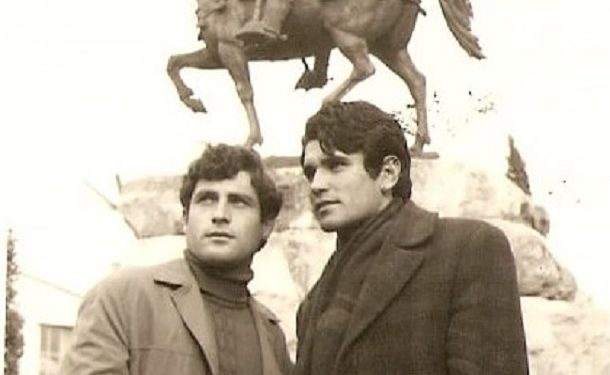By Fatbardh Amursi (Rustemi)
The third part
Wound healing balm
Entry
Memorie.al/ The triptych of this article, which could have the subtitles: “to go to jail for poetry”, “to see through a wound” and “to win over evil with poetry”, was written by friend for friend, Fatbardhi for Visar. Both grew up in the same town, in small Lushnja, with a large class war then, where in the suburbs began the villages of internment.
Visar and Bardhi were from the same neighborhood, went to the same school, and even stayed on the same bench until they finished high school. They liked poetry and started writing. But the fates would then be different, even opposite. While Bardhi was sent to study literature at the University of Tirana and became a high school teacher, Visar managed to go to Shkodra to study literature, because he “had a biography” against the regime, but he shot in the few years liberalism, as they were called and to be punished immediately…!
And here the paths of two friends of the same bank are divided. Visar would be arrested for his poems and taken to prison, the court gave him 10 years in prison, depriving him of the right to publish and electoral, if released, while Bardhi would continue with publications, from poetry to comedy, putting them in different scenes, etc.
Visari has shown with his later books his ordeal, mention and close friendship with Bardhi in his early youth, but it is interesting how Bardhi now sees what happened to his friend, the anti-visar time…!
The triptych begins when the two were in two different mines; Bardhi was taken with creative permission to the socialist mine of Pishkashi, to know the working class and to write, while Visar is in the mine of Spaç prison, convicted as an enemy, who secretly writes poetry as a prisoner.
Truly a special essay, written in a friendly way, that makes you discover, no matter how little, the times, the mindsets, the changes, the divisions, the unions, and to feel more than being friends, the poetry of life, must be stronger than regimes and are acts that face forgetfulness…!
Author
Continued from the previous issue
“Is it true that after a long time in prison, the prisoner falls in love with the cell?” – asks Ismail Kadare Pjetër Arbnori. “Yes, Mr. Kadare, the prisoner falls in love with the cell,” Edison Ypi wrote in his post “Falling in love with the cell.” (When the Berlin Wall fell, an East German went to visit the Great Wall of China) “Hey, did I miss you / for the prison, / did I not tell the man?” This provocative rhetoric of Visar more than disturbs the souls, shakes the perceptions. Who would not be surprised: longing for prison?! To shed light on this paradox, Walter Scott offers us his wisdom: “Wounds endured for the sake of conscience have in themselves healing balm.”
A rare occurrence, but not everyone is lucky enough to try it. These wounds that are endured for the sake of conscience, not a conscience anyway, but creative, is the moral height, where the poet places himself of free will. Pilgrims love temples on mountain tops. From the ideal relations of wounds with the conscience is obtained “healing balm”, a product so necessary where revenge has wreaked havoc. The poet, not having any debt to the past, owes only to the future, so he reveals his creed: “We did not write out of hatred, but out of pain”. This contract goes beyond any oath. How can one expect a “healing balm” from a “Pseudopoet…, who has tried to plant poisonous herbs in our pure literary garden”, now offering us the “healing balm”?! Only then can it be understood that an overthrow has taken place.
Falling in love with the cell is not a manifestation of “Stockholm syndrome”, where the victim worships the persecutor, waiting for salvation from his generosity. (The superiority of the defense lawyer in the dictatorship, favored the “Stockholm syndrome”. So you: you had no glass to pray, only to him, to have life in his hand. The persecutors were given the opportunity to play the best, where you were grateful for the evil they did to you.) Even where passion leaves little room for pain, the poet surprises, with verses like these: of my slain hands, / but handcuffs / Perhaps my smile is poorer than my wounds / that you move like a star-studded decor / for your profile”.
Aren’t the claws appearing just then, where the pets are expected? He is also tricked with handcuffs, calling them bracelets. “We showed our wounds / as if we were telling each other precious stones, diamonds / donated by a monster / We were proud of slavery / Criticizing it harshly / And we were finding time to be free / Once captives, we were no longer free? ” From the decor of the wounds adorned with the treasures of fear, is not the rematch of the prore medals with a background of losers starting like this? Is it the same inertia that happens to every liberator, whose soul is not separated from the war and will be no other than that: where does one live as in a siege? In these experiences, the poet asks the question: have the killers become the best? “Because they have an indefinite fear / lead women to open the door.” (Former Director of Prison Police, who “played the violin and piano”, complains that in prison “after losing the most beautiful part of life.” Complain guard and not a joke!
“Guardian of the Constitution”, they are also saying to the president?! Having no reflection, excuse me, in the eyes of art specialists, investigators and the guardian the poet continues to be undesirable. “We both had a status that we had not assigned to ourselves”, – declares the Chief of the Prison Police, having on his side the President of the Republic, against the poet…! In these conditions, why should the victim miss the cell, when his persecutors were supposed to be there? “Healing balm” is not for those who hurt. If Patrokli takes the clothes of Achilles, the prison soldier, do you think he has taken the uniform of Trifon Xhagjika?! (A uniform will follow me for the rest of my life, says Nobel laureate Pablo Neruda: persecuted by the Pinochet regime).
“Because of the clandestine poetry in prison, I stayed without becoming a rebel, nor a hero, a poet, no, no, I quietly believed in a future.” The protagonism of the poet is not a demonstration of force, it is not an obsession to appear, but an exercise of oneself through the power of speech and contemptuous silence. (When Odysseus returns to Ithaca and begins to eliminate his wife’s rivals, he finds a rhapsodist in an alcove. But who you are, he says. I am the poet, the outcast responds. Odysseus lowers his sword. You will describe all this that happened (Alexander, when he gave the order for the flattening of Thebes, ordered not to touch the house of the poet, Pindar).
In the prison of the chief of police, in Spaç in 1981, in the escaped poem, (thrown by the guard poet), entitled: “The line of imprisoned shoes” Visari writes: “Here are the spy shoes, / with the tie that it hangs like slander through the mouth “, followed by the verse of the poem” Dream “:” And let them make the gallery hell / you suffer to remain an angel.” If the persecutors from the “house of the dead” are waiting to exhume the body, Mother Teresa, right there: she raised the anthem to life. Those who put the poet in prison and those who saved the poems from prison, as an eternal battle of body and soul, prove that the Albanian society under dictatorship was not as submissive as it seemed, and as indoctrinated as they present it. We have a problem with heroism, we see it ourselves in the visible part of the iceberg, mostly with fabricated heroes, often confusing wax statues with those cast in bronze.
“I was handcuffed right in the middle of the northern city, Kukësi i Ri, not far from the big bridge, where the waters of the two Drines, Ziu and Bardhi, were still not sleeping…!”The palaces collapsed behind me, without noise in deafness.” Alongside the old town covered by the water of the hydropower plant lake, it was now the turn of the poet to sink (the right can be sunk but not drowned), who on September 2, 1979, dedicated the poem “New Kukes”, about two months before he was arrested: “We put the statue / on the boulevard / In the couple shop / finds pieces of ballad./ And the storks when they came / did not find the forest / Above the forest with antennae / The storks sat down.”
A year after Visar was released from prison, instead of the statue, in the town square, hangs the poet Havzi Nela. “The tie would not make sense if it did not become a hanging rope,” Visari wrote in a poem dedicated to Migjen, which investigators and editors accused of pushing reality. As can be seen, the “ties that hang like slander through the mouth” turned into a rope for the Kukës poet. “I am the Chairman of the Internal Affairs Branch and the other friend is the Chief of Investigation, who has discovered very large enemies and whole hostile groups, did you understand?” (In addition to this investigator, I am also doing my own breakdowns). “Let’s break down poetry with specialists, with prominent critics, with poets.” (Along with the most prominent specialists, I am also analyzing. Of course at another time. They discover the enemy, who first locked him in the newsroom and then in the prison cell. While I am dealing with the poet, with whom I had stuck in a bang, in a neighborhood, in a city and now in America).
“My father did not hide his pleasure and he could not wait for Razi Brahimi, a first class specialist, to see my poems…! One day he read my poems, gave it to my father. I had thrown them clean in that beautiful notebook, with the blue-marble lid, connected to that shiny metal spiral (like the body of a vine coming around a palace). To hear Razi’s opinion, I asked him if we could come together with a classmate of mine, he writes, so that we could benefit together. Yes, he said. And so, Bardh Rustemi objected to the remarks, the best critic in Albania, they said, Razi Brahimi “, – Visari writes in his burgology. (Comment is yours).
“-Why are you afraid to be an enemy?” – He told me as if I had refused a gift.
“I’m not so afraid,” I told him, “but I’m not.” “My creations become crimes. Kri (ji) me”. The poet refuses to be an enemy. They do the devil’s work by shaking the incense burner.
“The absurdity was stunning me…! Metaphors?! Will the police follow the metaphors? The same anger as editors and critics of the literary configuration…! “I had become better known as an enemy, not as a poet.” He leaves behind the red star, and with the “blue star of fate”, he goes to Kosovo, where he fights to protect a Jewish cemetery with the Star of David. Before the opening of the Israeli embassy in Pristina, the battle to protect a Jewish cemetery escapes the poet’s attention. When the Milosevic regime started ethnic cleansing, genocide, a book by Visar was published in Kosovo.
“What about my book of poetry, prepared by Anton Nikë Berisha / the most compassionate that it was published in Prishtina / they would throw me in the fire” ?, he will write, worried about the fate of the book, threatened again by the dictatorship. When you read the verses of a former prisoner: “I am always with the defeated / with their efforts / (who bring light), / I am with them until the moment of victory, then I leave, I abandon them / and I join / with the possible others “, believes even more in the” healing balm “of human pain.
Visari will turn the message of this poem into the slogan of his electoral campaign, as an MP in the capital: “I want victory without defeat”. The first to deal with the defeated was Homer. Although Greek, he sided with the Trojans. Hector remains dearer to the reader than Achilles, just as King Priam is wiser than Agamemnon. Italian soldiers were also defeated, but the Albanians sheltered them. Of course, one must distinguish the loser from the loser. And the losers are art specialists, investigators and cell guards, include if you want a president too.
In the poem dedicated to Ramush Haradinaj, Visari writes: “For the heroes / to become guilty / the anger of the defeated is enough”. This resentment of defeat continues today with other KLA fighters. This resentment brought about the ‘Wicked Year’ of ’97: “This is where the wicked revolution took place / We were all defeated. They had no friends, no ideals / … They had stolen our money / through pyramids and mummies everywhere / they had been enriched / … We could not calm down without enemies / otherwise you would have gone crazy like Kalashnikovs. They tear the sky apart. When God divided the lands, the poet, left with nothing, went to ask for his share. God says, “Where were you when I was dividing the lands?” “In heaven,” the poet replies. “Then look, when he divides the sky!”
“Invictus” – Latin invincible, is the title of the poem by William Ernest Henley, which Visar translated in prison. (Minush Jero was imprisoned after writing the drama “The Invincible”). “He was not in prison, I said to myself and I had one as a relief, better. But, you can be and without being, and vice versa, that being in prison, you can be free, “invictus”. Thanks to poetry, we have more resilience within ourselves to be as free as possible. Not so many heroes, but more people. “In an atheist country, where the invincible hero triumphed over death, even in the art of socialist realism thus (“Victory over death” is the title of a film), Visar recognizes the power of the soul to God, who is in heaven.
When the shrines were destroyed, Visar and I go to the church of Golem, raided. There we got cast icons and secretly, as if they were icon thieves, in fact, we were rescuing them, hiding them in my garden. I do not know who spied on us at school, the history teacher forces us to hand them over. We turned the saints, whom the teacher passed one by one to the beak and threw them on the stove. I remember this story every time I see pictures of Visar with the Popes.
The ruined altar of the homeland offers: “We, who loved the homeland so much, / loved us less / and remained poor. / On the ups and downs of fate. ” Therefore: “My children, / I apologize for this cruel homeland / and unjust.” In a TV show I followed a master of the couple, who advised that the wood suitable for the couple should be chosen from that side of the tree, which has not been beaten by the winds. I believe that I have met this condition. /Memorie.al















